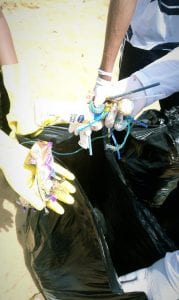“Goodluck finding someone who will put up with your crap as well as I did.”
– Mother Earth’s message to our egocentric species (at least, that’s what she should be saying).
On the 29th of July 2019, a youth group that I am a part of known as Smallstepsforchange.sl organized a beach cleanup along the Wellawatta beach which is known for being one of the most polluted beaches in Colombo. There’s not much to write about the event itself other than the fact that we spent about 5 hours cleaning the beach with about 10 of us in total. I have attended beach cleanups before but this one truly did blow my mind as this is a part of Colombo I rarely visit and to see the amount of trash getting accumulated there truly made me feel disturbed and disgusted by humans. The whole experience made me reflect on myself as an individual as well and really highlighted why my efforts at being eco-friendlier over the past year matter for myself and the planet I live on. Given the small number of people we had, we couldn’t cover a large area but we did manage an entire stretch and filled about 10 garbage bags worth of trash, making it a truly rewarding experience. I must be honest and say that I wasn’t left feeling the greatest as a person as I realized for the millionth time how, despite there being a handful of people who care enough about this planet to make some sort of change, there’s not enough of them, not enough of us.

Every day approximately 8 million pieces of plastic pollution find their way into our oceans.
There may now be around 5.25 trillion macro and microplastic pieces floating in the open ocean. Weighing up to 269,000 tonnes.
Recent studies have revealed marine plastic pollution in 100% of marine turtles, 59% of whales, 36% of seals and 40% of seabird species examined.
100,000 marine mammals and turtles and 1 million sea birds are killed by marine plastic pollution annually.
Of all the problems we face in today’s world, the one that scares me the most is plastic pollution. It is the one that breaks my heart the most, the one I feel most ashamed of for contributing into and the one I problem I just wish I had the solution for. To me, plastic pollution is a global crisis. Environmental degradation, as a whole, is a global crisis. And it is one that each individual must address. I believe it is mandatory for you to address these issues if you call yourself a human being and in some way, you must make the necessary changes to help protect Earth, our home.
“If current marine plastic pollution trends continue, the ocean will contain more plastic than fish by 2050, predicts the World Economic Forum report The New Plastics Economy. The Ocean Conservancy estimates that over 150 million metric tons of plastic are currently circulating in the ocean, while another eight million metric tons are added annually.” – Dinushka Paranavitana
This issue affects Sri Lanka significantly. Despite being one of the top five countries contributing to plastic in the ocean, approximately 221,000 fishermen contribute to around US$ 130 million worth of fish exports, making up 1.3% of the country’s GDP. Sri Lanka’s first attempt to control plastic usage began as early as 1994, when a gazette was issued by the Ministry of Environment, banning polyethene, which failed to be implemented. A second attempt in 2006 and a third attempt in 2017 sought to ban the production and the use of polyethene sheets, polystyrene based packaging and cutlery, and the burning of plastic and other similar combustible material. However, our government struggled to implement policies restricting the use of plastic, succumbing to pressure from plastic manufacturers and retailers. The Centre for Environmental Justice attributes the failure to the lack of stringent enforcement mechanisms by the government and the Central Environmental Authority.
Banning plastic in Sri Lanka is a contentious issue met with strong resistance from the general public. The resistance is twofold; first, from consumers who are reluctant to change, as plastic has become an integral part of their daily lives and second, from plastic manufacturers who produce around 120,000MT of plastic, equivalent to US$ 55 million annually. From history, it is apparent that the government did not put adequate efforts to providing the public with suitable alternatives to plastic. Simply imposing regulations and bans have no effect in solving the issue. Legislation should be present to push organisations and citizens towards responsible production and conscious consumption.
There’s really not much I need to say about this beach cleanup other than the fact that this is the least anyone should do. And you shouldn’t be living a more sustainable life just for the praise and just for the sake of saying it. Each person, as an earthling, it’s the least we can do to save our home. Because this is our home and we have a responsibility to take care of it.
Be the change you want to see in the world, they say. But sometimes, one person’s actions really aren’t enough to cause a significant change. And that’s what breaks my heart the most.
